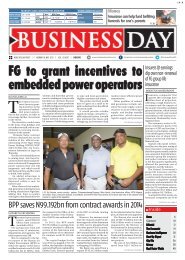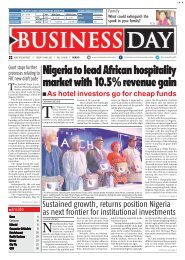You also want an ePaper? Increase the reach of your titles
YUMPU automatically turns print PDFs into web optimized ePapers that Google loves.
16<br />
THE NATION TUESDAY, APRIL 28, 2015<br />
THE NATION<br />
BUSINESS<br />
* The Environment * Mortgage<br />
* Apartments * Security<br />
* Homes * Real Estate<br />
PROPERTY/ENVIRONMENT<br />
Lagos State Governor<br />
Babatunde Fashola is<br />
set to leave a legacy of<br />
sustainable<br />
environmental<br />
management. One of<br />
such is the state’s<br />
yearly Climate Change<br />
Summit, which ended<br />
last week.The event<br />
was dedicated to<br />
examining<br />
achievements in the<br />
sector, reviewing<br />
challenges and setting<br />
agenda, MUYIWA<br />
LUCAS reports.<br />
LAGOS State has positioned itself<br />
as a leader in safe guarding the<br />
environment from the effects of<br />
climate change. Last week, it concluded<br />
its climate change summit, the<br />
seventh. This year’s edition was remarkable<br />
because it is the last one<br />
Governor Babatunde Fashola (SAN)<br />
presided over as the state’s chief executive.<br />
Fashola started the summit in 2009.<br />
The theme of this year’s edition was<br />
7 Years of climate change Governance in<br />
Lagos State, Celebrating success stories,<br />
reviewing challenges and setting future<br />
agenda.<br />
According to Fashola, since 2009,<br />
the summit has been the principal<br />
vehicle for attracting the required attention<br />
to environmental challenges.<br />
He stressed the need for humanity<br />
to reflect on the threat posed by the<br />
increasing world population to the<br />
sustainable exploitation and use of<br />
natural resources.<br />
For the governor, the results of the<br />
various climate change summits have<br />
been very useful to the state government<br />
in that it has helped in shaping<br />
most of its actions and policies regarding<br />
the environment.<br />
Some of these include the Eko Atlantic<br />
City Project, an adapted measure<br />
against climate change-induced<br />
sea level rise; improved waste management<br />
and transportation; the<br />
Lagos, Akute and Alausa Independent<br />
Power Projects which are gas<br />
fired, leading to the decommissioning<br />
of over 400 diesel fuelled electricity<br />
generators; the planting of<br />
over five million trees; the creation<br />
of over 100 parks and gardens across<br />
the state; and the establishment of the<br />
Lagos State Parks and Garden Agency<br />
(LASPARK), among others.<br />
Technical sessions<br />
The lead paper titled: “Climate<br />
change governance: Challenges and<br />
opportunities” was delivered by Director<br />
of Research Department on International<br />
Politics, Aberystwyth<br />
University, United Kingdom, Prof.<br />
Richard Beardsworth.<br />
He emphasised the importance of<br />
purposeful leadership to the challenge<br />
of climate change.<br />
The summit had eight technical plenary,<br />
with 26 papers delivered by experts<br />
from Nigeria, Scotland, UK,<br />
France, United States, South Africa,<br />
Canada, Egypt, and Cameroon.<br />
The papers covered various aspects<br />
of celebrating success stories, reviewing<br />
challenges and setting future<br />
agenda. The papers included: Post<br />
COP 20 Peru Climate Change Conference;<br />
implications for Developing<br />
Economy; Sharing Innovative Solutions<br />
in Climate Change Mitigation<br />
in Africa; From Waste to Wealth;<br />
Sharing public private partnership<br />
Website:- http://www.thenationonlineng.com property@thenationonlineng.net<br />
08062722507 muyiwalucas2002@yahoo.com<br />
Lagos: Counting the gains<br />
of climate change summits<br />
•From left: Fashola; his Commissioner for Environment, Mr. Tunji Bello and Prof. Beardsworth, at the summit.<br />
PHOTO: ISAAC JIMOH AYODELE<br />
(PPP)-PPP Experience in Establishing<br />
and operating material<br />
recovery facility in a developing<br />
economy; the Lagos State<br />
transportation policy and climate<br />
change mitigation and opportunities;<br />
mass transportation:<br />
the panacea for climate<br />
change mitigation in a developing<br />
economy; public transportation:<br />
role in responding to climate<br />
change; adopting green<br />
business for sustainability engaging<br />
corporate lagos; climate<br />
change mitigation: the role of financial<br />
institutions; and environmental<br />
sustainability in the<br />
extractive industry: The case for<br />
climate mitigation.<br />
Other presentations include:<br />
building resilience to climate<br />
change impacts: batnf and small<br />
scale farmers at the frontline;<br />
african coastal cities climate<br />
change vulnerability and adaptation<br />
planning: status and future<br />
plans; climate change policy<br />
and sustainable development;<br />
community energy as a vehicle<br />
for sustainable development<br />
and combating climate change;<br />
offshore energy for sustainable<br />
development in lagos state;<br />
turning liability into assets: taming<br />
the challenges of sea level<br />
rise into a vibrant City.<br />
The making of Eko Atlantic<br />
City; Lagos State Master Plan:<br />
Sustaining the Built Environment;<br />
among others.<br />
Observations<br />
The summit observed that climate<br />
change is a common global<br />
problem in which all states<br />
and people are involved as they<br />
are all affected, irrespective of<br />
the sources of Green House Gas<br />
(GHGs). Besides, it also observed<br />
that addressing the fundamental<br />
challenge of climate change for sustainable<br />
development and human<br />
survival is borne out of the concern<br />
that “nature does not need people,<br />
people need nature.”<br />
Other observations include that<br />
sustainability is a new direction for<br />
firms to effectively and profitability<br />
show-case their environmental<br />
consciousness; that there are many<br />
opportunities in the future of sustainable<br />
development that is imperative<br />
for human existence and<br />
survival; that green economy makes<br />
a lot of business sense and going<br />
green is a profitable business. It also<br />
provides new opportunity for global<br />
cooperation in the area of promoting<br />
energy mix, including<br />
renewables, for sustainable socioeconomic<br />
and environmental development.<br />
Importantly, participants observed<br />
that Lagos, as a coastal city, is highly<br />
vulnerable to the impact of climate<br />
change while rapid and unguided<br />
urbanisation,<br />
poor<br />
institutionalisation of public mass<br />
transportation with unsatisfactory<br />
commuter/freight demand are responsible<br />
for rapidly growing use<br />
of private vehicles in Lagos, even as<br />
mass transit is a key panacea to the<br />
poor transportation system in Lagos<br />
State, given the rapid rate of population<br />
growth and the desire of<br />
dwellers to own their own motor vehicles.<br />
The summit did not end without<br />
applauding the tree planting initiative<br />
of the Fashola administration.<br />
Participants restated that tree planting<br />
is an effective mitigation measure<br />
against the impact of climate<br />
change. Urban reforestation, in particular,<br />
is a laudable approach to improving<br />
carbon sequestration<br />
and mitigating climate changeinduced<br />
urban heat island.<br />
Also, it was observed that climate<br />
proofing agriculture and its<br />
resilience to variations in climate<br />
is critical for sustainable food security<br />
in the state.<br />
More importantly, the Eko Atlantic<br />
City Project was applauded<br />
as potentially an effective<br />
adaptive response to mitigate<br />
the impact of climate change<br />
on the coastal city of Lagos, and<br />
the use of only private sector resources<br />
for the execution of the<br />
Project is an innovative way to<br />
ensure its sustainability; just as<br />
an effective town planning is<br />
critical to sustainable urban development<br />
and making cities climate<br />
resilient. The absence of a<br />
legally binding policy and action<br />
plan on climate change at the<br />
state level, participants further<br />
noted, is of concern.<br />
Recommendations<br />
Twenty-five recommendations<br />
were made at the end of<br />
the event. These include: that<br />
government should continue to<br />
invest in climate change to promote<br />
environmental<br />
sustainability and assured future<br />
for human existence in the<br />
state; that Lagos as mega city<br />
must commit to addressing<br />
greenhouse gas emissions reduction;<br />
including introducing<br />
Controlled Parking Zones to<br />
deter the use of private vehicles<br />
and establishment of carbon<br />
registry to monitoring GHG<br />
emission levels, among others;<br />
that Lagos State should further<br />
enlarge its mass transit<br />
programme to transit it into an<br />
‘The Eko Atlantic City Project was applauded as potentially<br />
an effective adaptive response to mitigate the impact of climate<br />
change on the coastal city of Lagos, and the use of only<br />
private sector resources for the execution of the project is an<br />
innovative way to ensure its sustainability’<br />
integrated, coordinated and functional<br />
public mass transport system,<br />
complimentary road<br />
furniture’s and a comprehensive<br />
urban transport policy driven by<br />
empirical research study; that urban<br />
development should be controlled<br />
through appropriate measures<br />
that will reduce dependency<br />
on motorised vehicles and reduce<br />
the increasing need for urban infrastructure;<br />
that Lagos State<br />
should continue to showcase the<br />
benefits of its tree planting initiative,<br />
as a climate change mitigation<br />
and adaptation measures<br />
to other parts of the country; that<br />
the State should look into the feasibility<br />
of enriching its remaining<br />
forest areas in the context of<br />
REED+ to create financial value<br />
for carbon stored in forest, address<br />
the drivers of deforestation,<br />
enhance its carbon sequestration<br />
for climate change mitigation,<br />
and even provide additional<br />
means of livelihoods for the concerned<br />
communities; that the State<br />
should develop a climate change<br />
information management system<br />
in which all research outputs are<br />
catalogued and widely disseminated<br />
on a regular basis; that technology<br />
should be put in place to<br />
reduce GHG emissions from waste<br />
in the State; that youths should be<br />
encouraged and involved in the<br />
development of climate change<br />
mitigation technology; that the<br />
State should pursue a strategic<br />
alignment with the private corporate<br />
organisations in the State in<br />
its fight against climate change<br />
and promote research, development,<br />
demonstration and deployment<br />
(RDD&D), particularly in<br />
the development of technological<br />
response to the challenge.<br />
Other recommendations include<br />
that the Lagos State Green Fund<br />
(inspired by the Lekki Free Trade<br />
Zone) should be created to leverage<br />
funding from all sources –<br />
state, federal, bilateral and multilateral<br />
financial institutions - to<br />
promote green employment generation,<br />
investment, and innovation;<br />
that the State should establish<br />
a Lagos Green Eco-Innovation<br />
Forum that will be mandated to<br />
spearhead efforts to promote and<br />
intensify Nigeria’s (and African)<br />
efforts to meet climate change targets<br />
and goals through entrepreneurship<br />
and philanthropy; government<br />
should continue to support<br />
the African Coastal Cities Climate<br />
Change Vulnerability and<br />
Adaptation Planning Project towards<br />
making Lagos more resilient;<br />
Relevant stakeholders should<br />
be involved on a continuous basis<br />
in the execution of the Eko Atlantic<br />
City Project to ensure<br />
sustainability, and the Lagos State<br />
should ensure continuity in the<br />
implementation of the model city<br />
plan within the existing legal<br />
framework to further climate<br />
proof Lagos, while putting in place<br />
a positive, innovative, policy environment<br />
and strengthen existing<br />
regulatory framework, including<br />
tax incentives and governance<br />
mechanisms which will promote<br />
public and private investment in<br />
climate change mitigation projects<br />
in Lagos state<br />
Participants at the summit also<br />
recommended that the state government<br />
should explore the possibilities<br />
of developing a framework<br />
for the construction of energy efficient<br />
houses for both low and<br />
middle income earning residents<br />
of the State, urging the government<br />
to look into the feasibility<br />
of an Energy-Poverty Alleviation<br />
Fund to help provide modern energy<br />
services to the poor and the<br />
needy in the state.

















